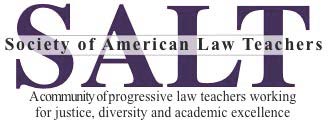Event Title
Concurrent Session 5A. A Social Justice Lens Turned on Legal Education from the First Year to Practice: Next Steps
Location
Room 460
Start Date
6-10-2012 11:20 AM
End Date
6-10-2012 12:20 PM
Description
This panel turns a social justice lens on legal education, starting with the first year curriculum, and uses this to illuminate how its overemphasis on common law and absence of public law has a marginalizing effect on students and adversely impacts ethical lawyering and the quality of lawyering in general. Panelists will suggest curricular restructuring which can create greater emphasis on existing inequality and best prepare students who either want to 1) embark on social justice careers or 2) help to represent marginalized, subordinated and underrepresented clients and causes but practice in another area of law or 3) simply be better, more effective lawyers. How can law schools best respond to the unmet needs of low income-Americans, counter the disincentives students face to pursuing public interest careers and address ethical issues more concretely? Might teaching law firms, certificate programs, and undergraduate opportunities serve as part of the answer in helping law schools to fill the “justice gap”? Answers to these and other questions will be explored and discussed during this presentation and for thirty minutes after the presentation at a time and location to be announced.
Concurrent Session 5A. A Social Justice Lens Turned on Legal Education from the First Year to Practice: Next Steps
Room 460
This panel turns a social justice lens on legal education, starting with the first year curriculum, and uses this to illuminate how its overemphasis on common law and absence of public law has a marginalizing effect on students and adversely impacts ethical lawyering and the quality of lawyering in general. Panelists will suggest curricular restructuring which can create greater emphasis on existing inequality and best prepare students who either want to 1) embark on social justice careers or 2) help to represent marginalized, subordinated and underrepresented clients and causes but practice in another area of law or 3) simply be better, more effective lawyers. How can law schools best respond to the unmet needs of low income-Americans, counter the disincentives students face to pursuing public interest careers and address ethical issues more concretely? Might teaching law firms, certificate programs, and undergraduate opportunities serve as part of the answer in helping law schools to fill the “justice gap”? Answers to these and other questions will be explored and discussed during this presentation and for thirty minutes after the presentation at a time and location to be announced.
